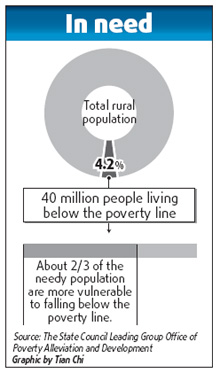Country's poverty line misleading, expert says
The number of people in China defined as poor would at least triple if not for the country's decades-old poverty line, a top agriculture expert said.
|
|
"The poverty line in China has not been changed for 20 years in step with the pace of economic development," said Li Xiaoyun, dean of the Center of Integrated Agricultural Development of China Agricultural University.
China's poverty line of 1,196 yuan ($175) per capita net income a year is said to be too low compared with the country's economic development and living standard.
The country's economy is expected to surge by 8.3 percent this year despite the global economic downturn, according to experts in the Chinese Academy of Social Sciences.
But the poverty line has failed to reflect the average standard of living, Li said.
At the end of last year, China had 40 million people living below the poverty line, accounting for 4.2 percent of the total rural population, according to the State Council Leading Group Office of Poverty Alleviation and Development.
However, the actual picture is far more worrying, mostly because of the outdated standard.
"We are now measuring a poor person with the standard of 30 years ago," Li said.
"The official poverty line is far below the current, actual poverty level."
China set a poverty line of 206 yuan in 1986, which was about $50 if calculated at the then exchange rate and was about half of a farmer's annual income.
Today, 1,196 yuan is just 25 percent of the average annual per capita income of the country's rural population in 2008.
China's poor actually totals 150 million, if using the internationally accepted $1 per day guideline, Li said.
The figure, previously less mentioned in China, is now cited by top officials on major international issues such as climate change.
Premier Wen Jiabao on Dec 17 at the Copenhagen conference on climate change said China is a developing country with 150 million poor people.
Professor Li Xiaoyun estimated that about 20 to 30 percent of the rural population is vulnerable to being driven back to poverty due to sudden sickness, natural disaster or economic recession.
A well-developed safety net needs to be quickly established in rural areas to enhance the immunity to poverty among farmers, Li said.
 0 Comments
0 Comments







